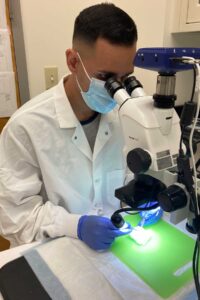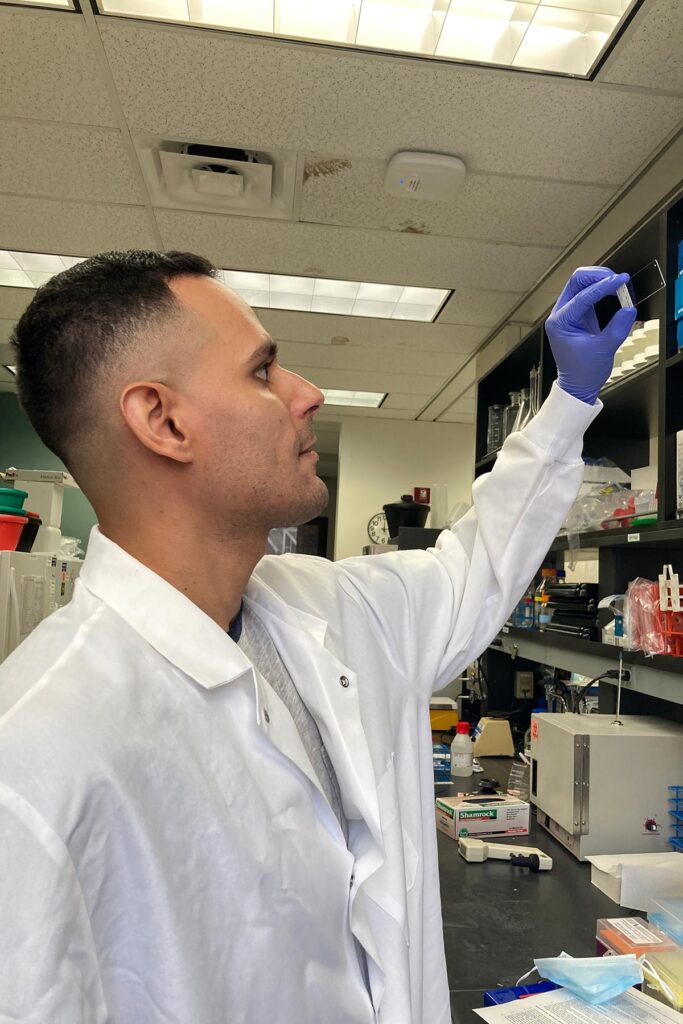Jesús Acevedo Cintron

During my graduate school phase my main focus is to move forward my project and learn how to conduct experiments and think critically while generating knowledge. Before the start of every week, I make an agenda of upcoming experiments, meetings, seminars and events. On a typical day I would review the tasks I have to do before arriving to lab, which may include starting or continuing experiments, organizing and analyzing data, preparing presentations, reading or writing scientific articles. Sometimes, during this phase students can also choose to participate in clinical research and/or student groups. During my first three years of graduate school I was part of the Latino Medical Student Association (LMSA) where I acted as the national conference chair of the 2019 LMSA National Conference celebrated here at WUSM, regional CDO in 2020 and regional Co-Director in 2021. I encourage students to look for these types of opportunities outside the lab because it allows you to develop a different set of skills, expand your professional network, find potential career mentors and even make new friends!
At this stage of my training, I have completed all the classes and requirements, but students can enroll in more classes if they choose. The school also offers a wide variety of seminars and workshops if students are interested in learning about a new field or technique. The biggest milestones (and requirements) for this stage are completing and passing the qualifying exam (QE), proposing the thesis dissertation and defending the thesis. Other milestones include presenting your research at conferences, applying to fellowships and publishing scientific articles. I know all these requirements sound daunting, but there is definitely time and resources to achieve these milestones and succeed. However, I do believe the success of the student not only depends on the student’s capabilities, but how the student fits in the lab, the expectations from both student and PI and their communication.

The PhD part of the training can be very challenging and draining. Oftentimes I have felt inadequate, burned out and defeated, and it can be hard to be enthusiastic and feel inspired with the constant failure. It has also been very difficult being away from home and from my family and finding people I identified with culturally. However, at the end of the day I remind myself that this is what I am passionate about, that I am representing my culture and people, and that the discoveries of my research can positively impact patient care and move science forward. And even with failure, there is always a lesson to be learned. For me, having something to look forward to outside the lab has helped me to recharge and feel inspired when things are not working out. Whether it is hanging out with friends or going on a walk, I use these moments to distract myself, reflect and recognize this is part of the learning experience and that I have all the necessary tools to succeed.
Although the PhD can be difficult at times, I also believe this is a good time to learn about other fields. For example, this past summer I had the opportunity to mentor a very talented undergraduate student. That experience helped me develop teaching skills and discover a passion for mentoring. The PhD life also offers a pretty healthy work/life balance where I have had the flexibility to learn and participate in different activities. During my PhD years I would go Latin dancing almost every week, I learned about exercise and fitness, learned and started investing in the stock market, became a semi-professional PokémonGo player and lately have been interested in getting into trading card games (TCG). So, to sum it into few words, the PhD phase is like a roller coaster (a bit longer than that really): it can have lots of highs and lows, it can have gloomy and enjoyable moments, it can be scary and thrilling at times and even though you can see it before getting in, you won’t really know how it is unless you try it. However, at the end of the day is another life experience with many valuable lessons to be learned.